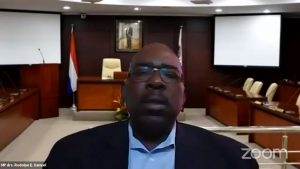Parliamentarians pressured to approve Penal Procedure Code, MP Samuel says

PHILIPSBURG — St. Maarten already complies with recommendation 35 of the Caribbean Financial Action Task Force (CFATF) and there is undue pressure on parliamentarians to urgently approve amendments to the Penal Procedure Code, Member of Parliament Rodolphe Samuel (National Alliance) declares in a press statement.
“The idea that Sint Maarten faces the possibility of being blacklisted allegedly has some members of Parliament advocating skipping the debate and proceeding to approve the concept ordinance Penal Procedure Code,” Samuel states, adding: “They just want to vote it into law, because it is said that this will save Sint Maarten from being blacklisted.”
But Samuel wonders whether it is necessary to approve the legislation to make St. Maarten compliant with the Vienna Convention, the Palermo Convention and the 1999 United Nations Convention for the Suppression of the Financing of Terrorism.
He points out that the Netherlands ratified the Vienna Convention in April 1985, the Palermo Convention in December 2000, while 188 countries ratified the 1999 UN Convention in October 2018.
The Dutch ratification of these conventions also applied to the Netherlands Antilles between 1954 and 2010 – and to St. Maarten for the period after it became an autonomous country in October 2010. “St. Maarten would have to denounce these treaties for them not to be in place.”
According to the press release, the only recommendation St. Maarten still has to comply with is number 35. Approving the amendments to the Penal Procedure Code would achieve this.
Samuel: “From the interim it has been drilled home that the passing of this ordinance will bring Sint Maarten closer to being CFATF compliant. Now it is feared by some that this same pressure may be guiding the actions of parliamentarians as the vote edges nearer.”
For clarification the press release quotes the text of CFATF recommendation 35: “Countries should take immediate steps to become party to and implement fully the Vienna Convention, the Palermo Convention, and the 1999 United Nations International Convention for the Suppression of the Financing of Terrorism. Countries are encouraged to ratify and implement other relevant international conventions, such as the 1990 Council of Europe Convention on Laundering, Search and Confiscation of the Proceeds from Crime and the 2002 Inter-American Convention against Terrorism.”
MP Samuel also mentioned CFATF recommendation 23 in his press release, but he noted that parliamentarians had been informed that “recommendation 35 is the only one that remains to be complied with.”
For completeness sake, here is the text of recommendation 23: “Countries should ensure that financial institutions are subjected to adequate regulation and supervision and are effectively implementing the FATF Recommendations. Competent authorities should take the necessary legal or regulatory measures to prevent criminals or their associates from holding or being the beneficial owner of a significant or controlling interest or holding a management function in a financial institution.
For financial institutions subject to the Core Principles, the regulatory and supervisory measures that apply for prudential purpose and which are relevant to money laundering, should apply in a similar manner for ant-money laundering and terrorist financing purpose.
Other financial institutions should be licensed or registered and appropriately regulated, and subject to supervision or oversight for anti-money laundering purpose, having regard to the risk of money laundering or terrorist financing in that sector. At a minimum, businesses providing a service of money or value transfer, or of money or currency changing should be licensed or registered, and subject to effective systems for monitoring and ensuring compliance with national requirements to combat money laundering and terrorist financing.”
Image caption: Screenshot of MP drs. Rodolphe Samuel during the first ever remote meeting of Parliament conducted via video-conferencing on Monday, March 23rd, 2020.
###
Related article:
Financial Action Task Force finds “a wide range of shortcomings”
























